Published Jun 3, 2021
Queering the Bromance Between O'Brien and Bashir
How DS9's resident odd couple queers the narrative. ????
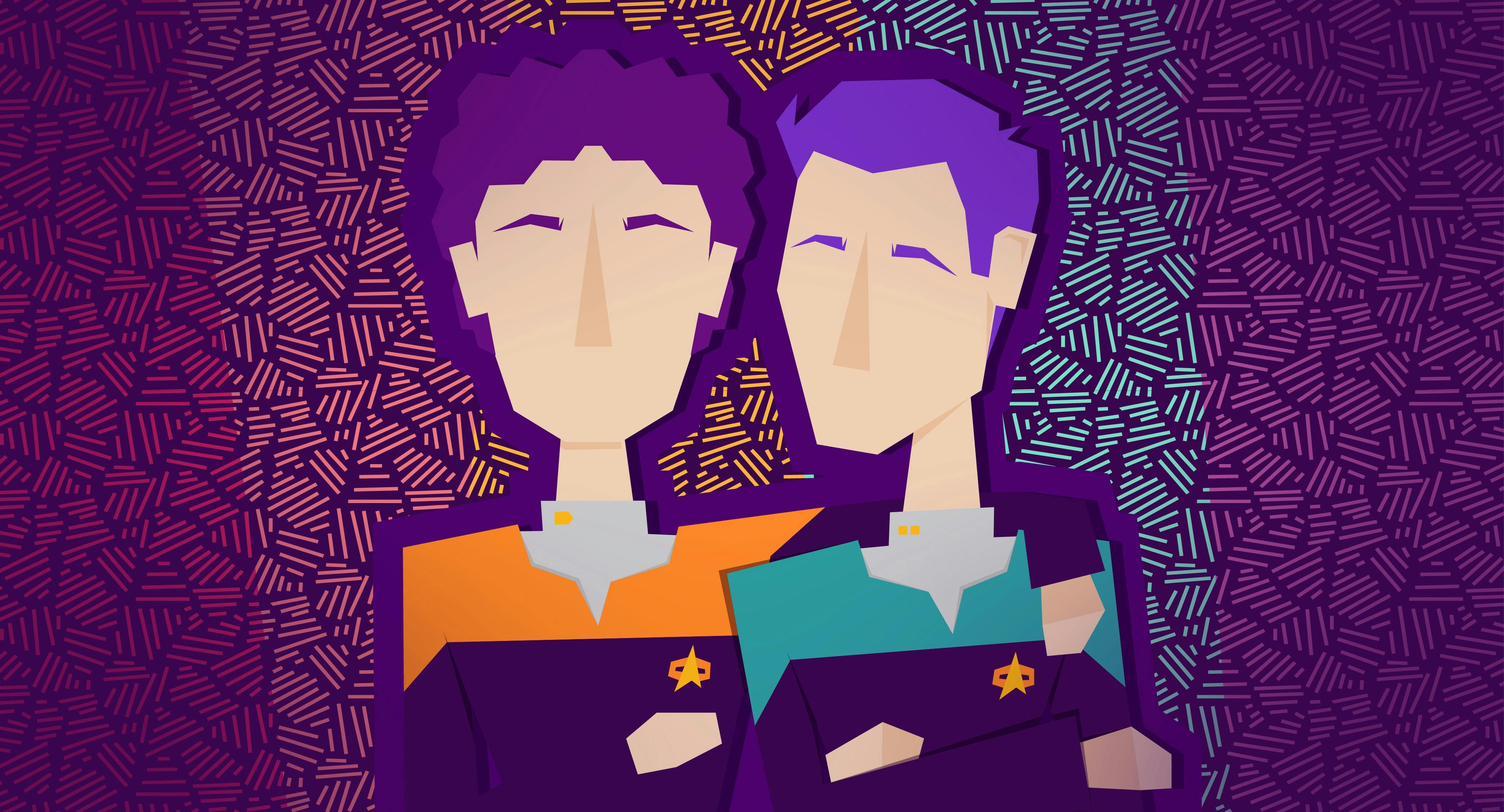
StarTrek.com
Deep Space Nine is a show about connections: the friendships, camaraderies, bitter rivalries that turn into deep abiding love between people. Miles O’Brien, the everyman Chief of Operations, and Dr. Julian Bashir, the spoiled, foppish Starfleet officer, are often cited as one of Trek’s best bromances — a bitter rivalry that became one of the most endearing relationships in the franchise’s history.
But more than a refreshing example of a healthy, platonic friendship between men (something explored on this very website), O’Brien and Bashir’s interstellar bromance is a classic example of homosocial behavior, which borders on homoromantic. At the end of the day, we know that Miles and Julian carry attraction to women: the former with his wife Keiko, the latter with numerous unrequited crushes until finally getting together with Ezri Dax in the final episodes of the series. Yet even their love interests know that O’Brien and Bashir’s hearts truly lie with each other.
“But Clint,” you protest, “O’Brien and Bashir are totally not gay for each other!” And I agree; I’m in no way saying Miles and Bashir took a little extra time in the holosuites to recreate their own Alamo, if you catch my drift. But their deep, abiding affection for one another is queer in its own right, even if their bond isn’t exactly sexual.
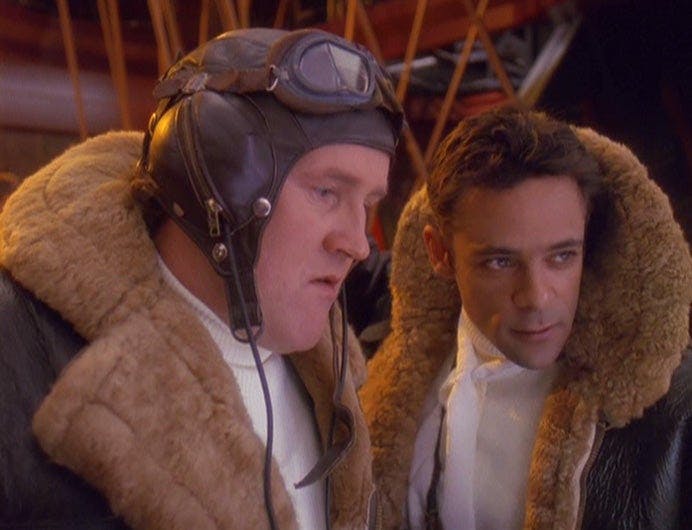
StarTrek.com
Queerness, after all, exists in a continuum outside the mere realm of sexuality; rather than thinking of it in terms of who’s getting jiggy with whom, it’s more useful to consider how relationships and even systems can be queer — i.e. operating outside the heteronormative norm.
In Between Men: English Literature and Male Homosocial Desire, feminist critic Eve Kosofsky Sedgwick uses the term ‘homosocial’ to describe the sentimental male bonding that involves negotiation between platonic and romantic. You see it in all the most prominent male/male friendships in media, from I Love You, Man, to Avon and Stringer Bell on The Wire. Hell, Kirk and Spock from The Original Series are the stuff bromances (and slash fiction) are made of!
Most people commonly understand the ‘bromance’ to be little more than intense male friendships — the kind men could enjoy if unshackled from the restrictions of toxic masculinity. But the unfettered adulation of the bromance is innately queer, regardless of the sexuality of its participants. Michael DeAngelis, in his anthology Reading the Bromance, says that the phenomenon, “has come to denote an emotionally intense bond between presumably straight males who demonstrate an openness to intimacy that they neither regard, acknowledge, avow, nor express sexually.” The bromance is innately subversive of traditional roles of heterosexual maleness, breaking down barriers of common masculine codes and teasing the possibility of something more between its participants. There’s a negotiation between homosexuality and heterosexuality, connoting the traits of neither but somehow encompassing both.
The slow, gradual buildup of O’Brien and Bashir’s bromance over the seven seasons of DS9's run illustrates the many small, important ways their adoration (and eventual love) for each other manifests itself.
Initially, the two are oil and water, O’Brien frequently annoyed by Bashir’s chatterbox naivete and youthful arrogance. But in season two’s “Armageddon Game,” a life-and-death situation (on the run from a shadowy government conspiracy) forces them in close proximity to one another, and create an opportunity to bond. There, they find common ground over their differing attitudes toward romance and their careers, the settled non-commissioned officer impressing upon the young doctor the value of marriage and commitment. Their differences — ones of class, age, and even nationality — bleed away into mutual respect and admiration.
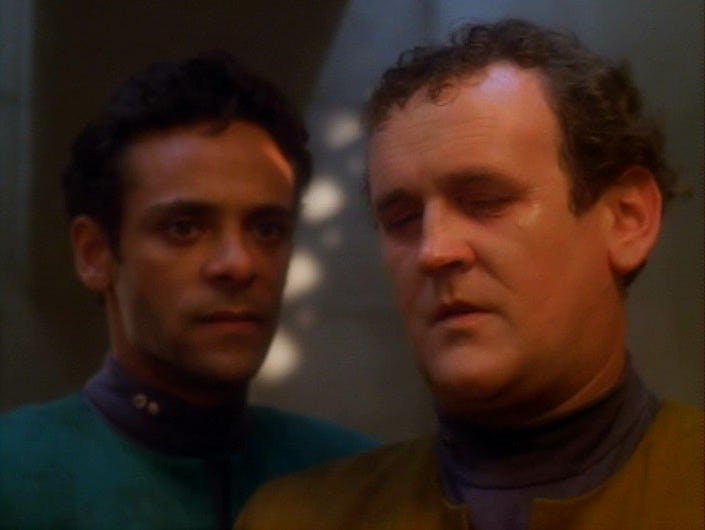
StarTrek.com
By season three, the two are inseparable, spending all of their free time together, consoling each other in times of trouble, and channeling their differences into a friendly rivalry over everything from darts to springball. And yet, it’s in the episode “Explorers,” when the two get drunk to take Julian’s mind off being spurned by an old Academy classmate, that Miles almost lets slip how he truly feels about Julian:
“People either love you or hate you. I mean, I hated you when we first met. But now…”
“Now?”
“Well… now I don’t. That’s from the heart, eh? I really do…. not hate you anymore.”
Like a lot of media bromances, the show plays cheekily with the ‘no-homo’ nature of their dynamic. In season four’s “Hippocratic Oath,” O’Brien complains that his wife isn’t more like Julian, which subtly implies that the good doctor carries at least some of the traits he desires in a partner:
“See? You understand! Why can’t Keiko see that? Why can’t she be more like…”
“More like…”
“.....A man. Eh, more like a man.”
“So, you wish… Keiko was a man.”
Does this mean that O’Brien wants to jump Julian’s genetically-engineered bones? Of course not! But the nature of bromance and homosocial desire defies those kinds of labels. The pair aren’t bisexual per se, but share a love that’s slightly more than platonic. They’re not acquaintances, and they’re not just besties: they need each other in some ineffable way.
As with “Explorers,” this particular breed of man-love is stifled under O’Brien’s gruff, working-man stoicism, unable to outright say that he loves his best friend. But the beauty of Colm Meaney and Alexander Siddig’s performances are the little gestures in between — a stolen glance, a half-hidden smile, an arm around the shoulder. The characters may not say it, but their comfort and closeness with each other tell us everything we need to know.
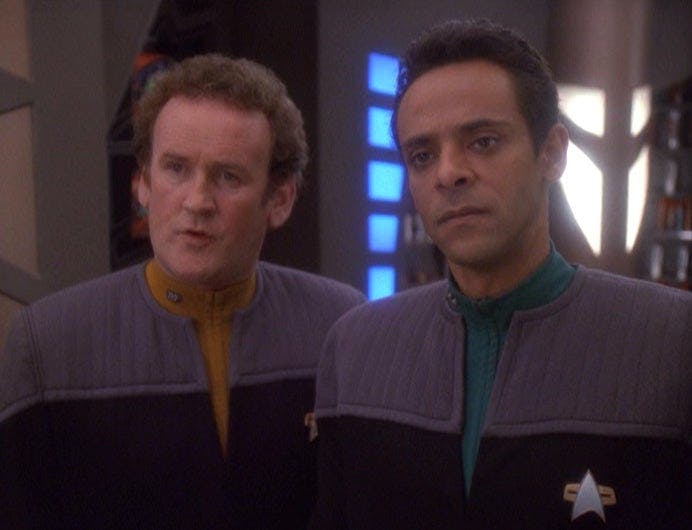
StarTrek.com
And the show knows it too — take the pair’s last big adventure together, season seven’s “Extreme Measures”, where Miles admits to Julian that Keiko “always said that I liked you more than I liked her.” There’s something about Bashir that O’Brien craves in his own personal life. Julian fulfills certain needs that his wife can’t satisfy — the need for masculine camaraderie and the mutual sense of duty and responsibility that comes with their missions in Starfleet. As for Julian, it’s clear he takes to Miles’ down-to-earth demeanor and sense of stability, which temper his own youthful flights of fancy.
The best part is, Keiko realizes and respects these needs, eventually coming to understand the role Julian plays in her husband’s life. At the end of “Extreme Measures,” she even invites Julian to dinner. It’s hardly Sunday Bloody Sunday (John Schlesinger’s film about a menage a trois between an upper-class couple and their young, single paramour), but the notion that O’Brien can benefit from both the men and women in his life for his various emotional and personal needs is heartwarming and inclusive — classic Star Trek.
Like so many aspects of queerness and sexuality, the lines between homosexuality and bisexuality and homosocial intimacy are deeply fuzzy and depend on the individual. But as a bisexual person myself, I’ve been particularly frustrated at the lack of representation we’ve had not just in Star Trek, but in media in general. There’s inherent invisibility to our stories — if we’re with someone of the same gender, we’re read as gay or lesbian; if our partner is of the opposite gender, we read as straight. Unless you’re explicitly dealing with polyamorous relationships, or depict them as villainous pansexual hedonists, it’s hard to find bi people on screen who can express the specificity of their orientation without seeming promiscuous or self-deluding.
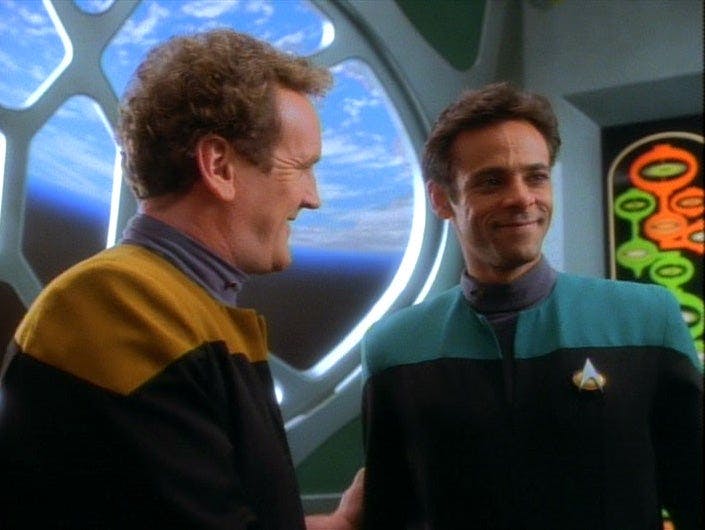
StarTrek.com
Maybe it’s for that reason that O’Brien and Bashir’s dynamic resonates so deeply with me. I’ve had long-standing platonic friendships with other men like that, and (whether they knew it or not) it felt like a safe space to practice emotional vulnerability around other members of the same sex. Sometimes it blossomed into something more, sometimes it didn’t. But all of those relationships carried (and still carry) tremendous importance to me.
As a young queer kid who wouldn’t end up crystallizing his feelings about sexuality until he was a settled adult, seeing O’Brien and Bashir on screen, throwing back pints and sharing so many intimate moments of their lives together, made me feel like I wanted that in some way. I didn’t have to see them lock lips to see how much they loved each other; Trek wouldn’t give us that explicitly queer representation until Discovery anyways. But in the synthales and darts games and awkward heart-to-hearts these two characters shared, I saw the potential for closeness. And that means the galaxy to me.
Clint Worthington (he/him) is a Senior Writer for Consequence of Sound and editor-in-chief of The Spool, and you can find him on Twitter at @clintworthing. He lives in Chicago with his wife and cat.
